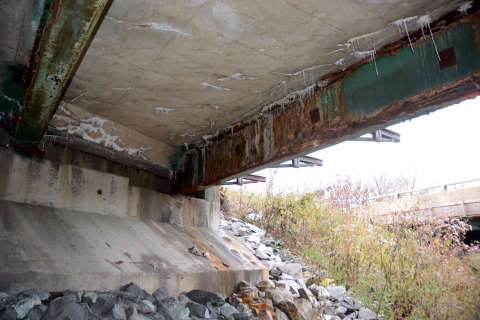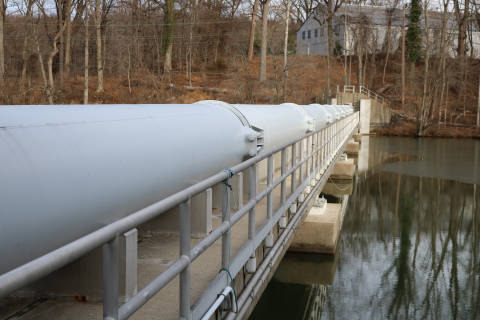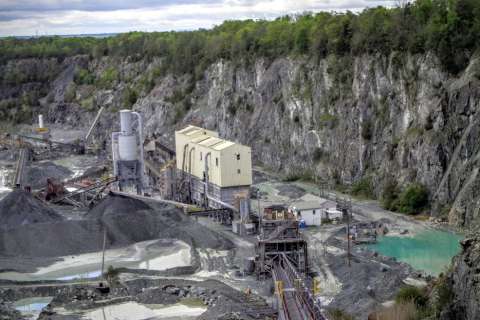This is the first story in WTOP’s series, Crumbling Capital, scrutinizing the decaying infrastructure in the D.C. region and what’s being done to fix it.
WASHINGTON — After a deadly 2009 crash on the Red Line, Metro plowed $5 billion into improvements. But the transit agency was left with little to show for the money spent after a train filled with smoke near L’Enfant Plaza nearly two years ago, trapping dozens of passengers and killing a 61-year-old rider.
The fatal smoke incident exposed faulty work and the fact that Metro had continued to ignore safety threats, which still plague the agency today and has led to renewed attempts to dig the agency out of a 40-year hole.
“There will have to come a day of reckoning as to what happened here,” D.C. Council member and Metro Board Chairman Jack Evans said earlier this year. “Carol Glover died on the floor of a Metro car after a five-year period of fixing this place, and that’s an unacceptable end to that whole experience.”
Evans spoke this summer as Metro launched a new series of work zones and temporarily cut late-night trains on weekends.
General Manager Paul Wiedefeld has said that rebuilding plan, now known as SafeTrack, has given workers the extra time needed for maintenance and inspections that were being done incorrectly or not being done at all. And just this month, the Metro Board approved long-term service cuts that will begin July 1.
Wiedefeld: ‘I’m not going to turn it around in months’
Even amid the safety blitz, problems on and off the tracks have persisted.
Standing in a work zone this summer, Wiedefeld detailed repairs to reporters, pointing out crumbling rail ties. “This has been pushed off as long as it can be pushed off,” he said.
Just days later, a Silver Line train derailed due to crumbling rail ties a few hundred feet away from that work zone. The investigation into what led to the July 31 derailment eventually exposed years of falsified inspection reports that resulted in Metro leadership disciplining nearly half of its track inspection department.
Separately, the Federal Transit Administration concluded in reports released this month that radio communication to and from the troubled Rail Operations Control Center is improving, but some transmissions still do not always go through. Communication with the control center was among the contributing problems in the January 2015 smoke incident that led to Carol Glover’s death.
Evans proclaimed in November that Metro was doing “really well” compared to just before Wiedefeld took over a year earlier.
“There has been a culture here over decades that has evolved, and I’m not going to turn it around in months,” Wiedefeld told lawmakers at a congressional hearing this month.
‘Back2Good’ or ‘death spiral’
Wiedefeld said he hopes that if Metro one day runs on schedule with fewer smoke incidents, railcar problems and other delays that riders will come back.
Ridership has steadily declined since 2009.
“We’ve lost 100,000 riders a day. That’s a staggering variance,” District Department of Transportation Director Leif Dormsjo said at a regional transportation forum. “We’ve got to recapture those riders. Our highways, our roads, can’t withstand any more diversion away from the rail system.”
The agency’s plan for bringing discouraged rail riders back into the fold after SafeTrack work ends is unambitiously dubbed “Back2Good.”
“[Riders] get more frustrated when we say we’re going to do something and we can’t deliver,” Wiedefeld said.
Wiedefeld’s budget proposal for the year that begins in July would cut the number of trains and increase scheduled wait times at all times of day. It would also raise fares for the first time in three years while also asking for more money from the region’s governments.
Jackie Jeter, the head of Metro’s largest employee union, has argued the proposed budget would put the agency in a “death spiral,” something then-Metro leaders warned more than a decade ago would be the result of putting off needed maintenance.
Amalgamated Transit Union Local 689 is in the middle of contract negotiations with Metro, and Jeter said the transit agency is still not headed in the right direction and is lacking a long-promised safety culture.
‘Groundhog Day’: Issues keep popping up
Documents released by federal inspectors have shown that at least some workers do not know what they are doing. In part, Jeter laid the blame on a lack of intensive training.
“We’ve done this over and over again; we’ve looked at operations, we’ve found people that don’t know what speed limits are, we’ve looked at track, we’ve found that defects are left in place for long periods of time — it’s got to be fixed within,” Federal Railroad Administration Chief Safety Officer Robert Lauby said at December’s Metro Board meeting.
Lauby said more outside oversight — like that Metro has had from the Federal Transit Administration for just over a year — or more consultants will not solve the problem until Metro can actually show that work and inspections are being done and are being done correctly.
Federal inspectors are like umpires at a baseball game, Lauby said.
“They can call the balls and strikes, they can tell you if you’re safe or you’re out. But the people on the field have to play the game, and the people on the field are the staff here at Washington Metro,” Lauby said. “They have to play the game, they have to play it to the best of their ability, and the coaching has to be there to actually work with the folks and make sure that they understand what the job is and that they understand that they’re actually achieving that,” he said.
Federal Metro Board Member David Strickland said Metro seems to just go through cycles, over and over.
“We keep having a ‘Groundhog Day’ number of issues about things that we find, we get a good report out, and then we have a similar issue pop up some period later,” Strickland said.
Tug of war on the Metro Board
A series of regional spats over a variety of issues, including billions of dollars Metro needs for basic maintenance and repair requirements, has not helped the situation. Those disputes have contributed to Metro sticking with the status quo at times previously.
“We’re not even close to fixing this thing,” Evans said at the congressional hearing this month as he sparred with Virginia Democrat Gerry Connolly.
“Lamentations about performance will not solve Metro’s problems if we continue to ignore the dysfunctionality of the Metro Board, the culture of indifference that pervades the workforce, and the absence of stable revenue,” Connolly said.
Virginia Gov. Terry McAuliffe called the board “a joke” on WTOP’s Ask the Governor in late November.
“No one has come to me with a plan: ‘Here are the problems. Here’s what we need to fix. And here’s what it’s going to cost’,” he said. “I mean, this is lunacy.”
But Maryland Transportation Secretary Pete Rahn has said that while the Metro Board is complex, the massive effort it would take to overhaul it, including congressional action, is not worth the energy when the system faces such monumental problems.
Metro has made some progress getting its fiscal house in order, including finally completing a clean and on-time audit and just recently meeting FTA requirements for documenting spending that now allows easier access to some grant funding.
The agency is in the process of figuring out the actual condition of every single item it owns, and believes that even if everything has been properly taken care of, it would need $25 billion over the next 10 years for basic safety, technology and other upgrades.
The transit agency is only now trying to figure out exactly how much money it would really take to keep the system running at any reasonable standard.
“Here we are in the nation’s capital with all the visitors we have from around the world, and we have a system that we’re not very proud of. And I think that’s a disgrace,” Wiedefeld said.







